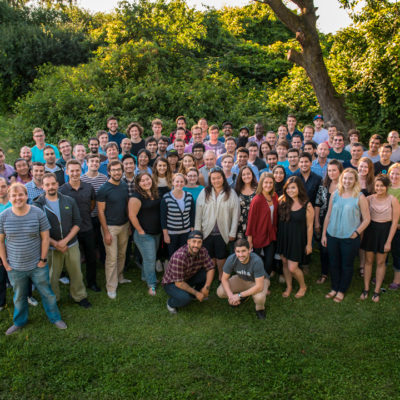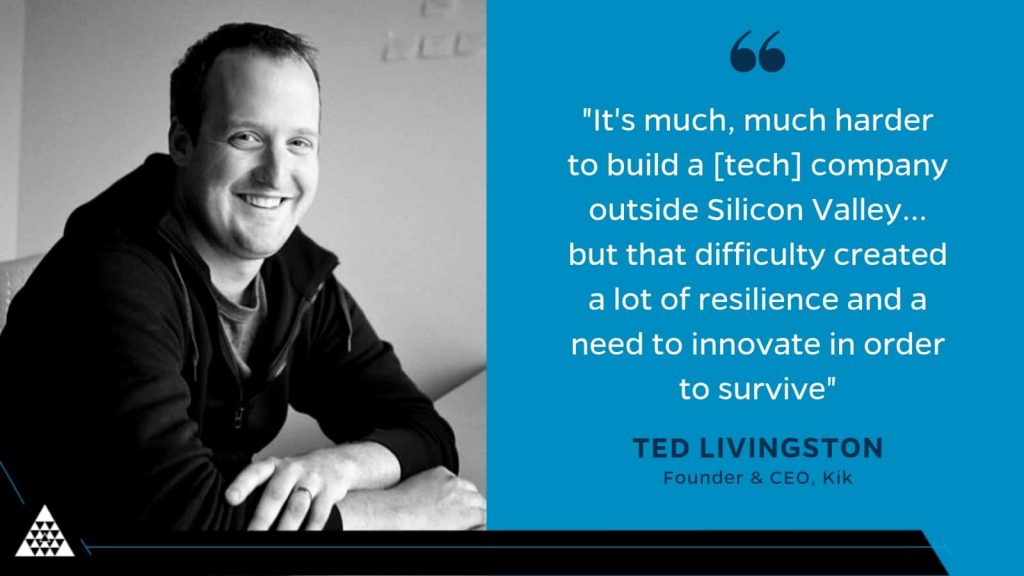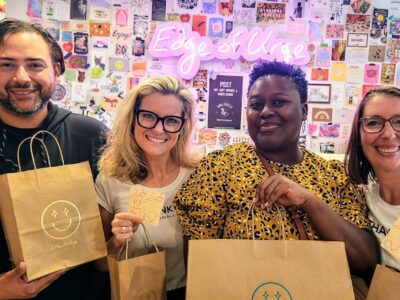Ted Livingston showed a dramatic commitment to innovation early on in his career. At age 23, the Canadian tech entrepreneur sold a tranche of personal stock in his messaging company Kik for USD1 million. Most entrepreneurs that age would have gone straight out and bought a penthouse — or at the very least an impractically fast sports car.
Livingston decided instead to donate the money to his alma mater, the University of Waterloo, just west of Toronto, to create a start-up fund for young people with big business ideas. Deciding what to do with the cash was easier than getting hold of it, however. “I went into some random branch of my bank and said to the teller, ‘Hi, I’d like a check made out to the University of Waterloo from my account,'” says Livingston. “She said, ‘How much?’ I said, ‘A million dollars.’ She paused, looked at me and said, ‘Hold on, I need to get a manager.’
Livingston, now 32, saw his gift go on to help fund innovation in multiple new companies. “That million dollars I donated at 23 has gone on to create over a billion dollars in equity value,” he says. “That’s a pretty good feeling.”
The best advice
Livingston’s own big break came courtesy of a tip-off from a well-meaning colleague while he was interning at BlackBerry in 2007 as part of a university course in engineering.
“BlackBerry was growing incredibly at the time,” says Livingston. “It had tens of thousands of employees. It hired thousands of interns like me and gave us all BlackBerrys with unlimited data plans. Back in 2007, my entire social circle and I had a smartphone that was always on, always connected before anybody else anywhere in the world.”
Livingston ended up in a team of 10 charged with product management for all the consumer apps on the phone, including instant messaging, email, and BlackBerry Messenger.
“After a year in the job, a senior manager said, ‘You’re good at this, you should drop out of school and come work for us full-time,'” says Livingston. “But just before I did, my boss at the time pulled me aside. He said, ‘Ted, I know you’re really excited about BlackBerry. I know you really love it here, but this company is in trouble. You’re good at this, you should go back to school and start your own mobile company.’ It was the best piece of career advice I’ve ever gotten in my life. By far.”
Capitalizing on shortcomings
In January 2009, Livingston went back to his beloved University of Waterloo and moved into a new residence on campus called ‘Velocity’, designed for people who wanted to start companies. It was here that he would launch Kik, inspired by new trends in the tech market.
“The idea at the time was that mobile was going to be really big [and would] enable all these new interactions, new technologies and new experiences,” says Livingston. “We played with building some music apps because music wasn’t that great in BlackBerry, we played with some other things, but ultimately we landed on building a chat app.”
Livingston and his team were also driven to innovate by the shortcomings he perceived in other communication services.
“We got Facebook in my freshman year at Waterloo in 2005,” he says. “We watched it go from this amazing authentic place into almost a popularity contest and a game. ‘Hey, I have these pictures of myself but I don’t want to post them. Would you mind posting them so they show up that somebody else did that?’ And ‘Oh, look at all the likes I got. Wait, you have fewer friends than we do!’ We saw that transition, and it didn’t sit well with us. We said, ‘Hey, we want to build a place where you just come, hang out, be yourself, and it’s not a popularity contest.'”
And so Kik was born. “It’s chat, it’s one-to-one, or one to a few people. It’s a username not a phone number so you can have consistent control over your identity, and there’s no broadcasting, likes, or feed. It’s just about authentic connection,” says Livingston. After a test version, the full launch took place in October 2010. The growth was extraordinary. “It just went viral,” says Livingston. “We went from zero to a million users in 15 days and from a million to two million users in seven days. My mom called me to say, ‘Ted, Whoopi Goldberg’s talking about Kik on The View.’ It was a totally amazing and surreal time.” In the last nine years, Kik has grown to a staff of 150, has raised USD120.5 million from investors and has gained a reputation for what Livingston calls “seeing the future first”, which led to him being recognised as one of Fast Company’s ‘Most Creative People in Business.’ Kik was the first chat app to become a platform, back in 2011, and the first in the West to embrace the use of chat-bots in 2014, opening up new opportunities for intelligent interactions between businesses and users. In 2017, Livingston launched a cryptocurrency, Kin, and mounted an Initial Coin Offering (ICO) which brought in USD98 million. “Kin is a way to get payments into a mobile app to allow for any amount of value being transferred anywhere in the world, without needing to add a thousand employees to your compliance department,” he says. “We let people do peer-to-peer transactions with each other, and then see what behaviour emerges from there.” Kik users are able to earn Kin through activities like moderating popular public groups. “It adds a way to make the experience of our community better, to give people skin in the game so they take community experiences more seriously,” says Livingston. “It’s also a way to make money through a fundamentally new business model.” There are now 250,000 monthly active spenders using Kin. Livingston believes the combination of Kik and Kin could lead to a complete transformation in the relationship between advertisers and customers. “All the business models for consumer apps which are mainly just advertising are a win-lose,” he says. “It’s a win for the company but a lose for consumers — their attention, and data, and privacy is being taken and exploited without them even having this chance to either opt in or opt out … But if I’m [giving these things] to advertisers, they should compensate me. For us, Kin is really the ultimate win-win-win. It’s a win for our users, it’s a win for us, and it’s a win for mobile developers as a whole.” The headquarters of Kik is still Livingston’s beloved Waterloo: he has managed to resist the siren calls of California. “It’s much, much harder to build a [tech] company outside Silicon Valley… but that difficulty has created a lot of resilience and a need to innovate in order to survive,” he says. Perhaps unsurprisingly, Livingston has grand plans for Kin. “Our ambition with Kin is to become the most used cryptocurrency in the world, but in doing so, build a fairer world,” he says. Given his track record, you wouldn’t bet against him. To hear more about Ted Livingston’s vision to turn tech on its head through innovation, YPO members can check out YPO Innovation Week at http://www.ypoinnovationweek.com/schedule.
An authentic connection
From chat to crypto

Creating new relationships
Doing it his way



